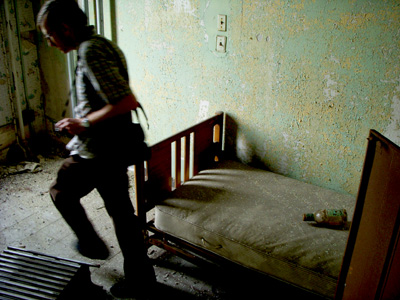 I was relieved when my great-grandfather died. I learned of the event more than a year after the fact, simultaneously ingesting the information that he’d passed in Idaho, that he’d been buried in Montana, and that his grave—while next to my great-grandmother’s—was unmarked and expected to remain that way. No one in Idaho wanted him buried there, and no one in either state would spring for a tombstone.
I was relieved when my great-grandfather died. I learned of the event more than a year after the fact, simultaneously ingesting the information that he’d passed in Idaho, that he’d been buried in Montana, and that his grave—while next to my great-grandmother’s—was unmarked and expected to remain that way. No one in Idaho wanted him buried there, and no one in either state would spring for a tombstone.
A horse-thief-turned-burglar-turned-forger-turned-rapist probably can’t expect much better, even if he is family.
The last time I saw him I was twelve, and he was standing stolidly in the white-gravel of his driveway and asking, “Are you mad at me? Because your mother sure is.” He was remarrying. No one was anything but mad at him. I nodded my answer, dropping an armload of brightly colored books into the trunk of my parents’ red Volkswagen.
Almost thirty years after I nodded my answer, I discovered Chips’ prison records from 1937. “His picture,” I say over dinner and around a mouthful of steamed broccoli, “was right on top of the file. It didn’t look anything like him, didn’t look anything like the guy in all the other mug shots even.”
Elizabeth shrugs and doesn’t point out that the picture is of a thin boy who just turned eighteen, while the great-grandfather I remember was sixty-five and fat and remarrying and liked to push his thumb into the bottom of pieces of chocolate to get a glimpse of the filling. When he was finished, there’d be a sweet-smelling cardboard container staffed by a random smattering of violated candies that no one would eat.
John is three and sits to my left at meals. He knows I’m going to make him eat broccoli before he can leave the table. Now, as I speak of my great-grandfather’s long criminal record, John furrows his brow and asks, “What papa?”
This is a simple grammatical structure for a complicated question: I chew and consider my range of possible answers. John still hasn’t grasped that my father is his grandfather, so this discussion of Chips is already on some shaky ground. Too much abstract genealogy.
Elizabeth steps in to save me from the place I’ve talked myself into: “This papa died a long time ago, John.”
He looks from his mother to me. “He got dead?” I nod and eat more broccoli. Because I’m an English teacher, I almost never correct my son’s grammar, even when it’d be a good way to change the subject. John immediately shares his new knowledge across the table with his twin sister: “Hey, Sam!” This comes at full volume, John leaning from side to side to see around the collection of salts and spices that serve us as a centerpiece. “Sam! The Icky Papa died!”
I notice that “got dead” has become “died,” which is good. Chips has also gone immediately from being an abstraction to being an icky, which is both hard to understand and hard to correct. Chips was icky. Still, my instinct is to defend him—or at least to correct my son’s rudeness. “Honey,” I normally would say, “We don’t call people icky. That’s not nice.” But I can’t correct him here because he’s right and because I’m the great-grandson who smiled when he learned that Chips was dead.
“Honey, eat your broccoli. That’s all that’s standing between you and dessert.”
At bedtime, John’s serious, not even singing the ABC song. I tell him the story of Terry Troll, resident bridge builder in my Kingdom of NeverEverWas, and he doesn’t interrupt. As I begin to leave, he stops me: “Daddy? The Icky Papa died?” His voice is filled with innocent anguish that hurts me deep in my chest, hurts me in a scary, middle-aged way I’m not ready for.
“Yeah.” My knees both pop loudly as I stand.
“Were you mad?”
His question freezes me, sends a spider down my spine. “No, John, I wasn’t mad.”
My answer satisfies him, at least. John rolls to his side, faces the wall, falls asleep with his arm over the battered orange and green cover of Go Dog Go. I watch him breathe, my mouth dry, my feet planted solidly on the graying bedroom carpet.
—
Shane Borrowman is an Assistant Professor of English at the University of Nevada, Reno, where he teaches courses in freelance writing and editing, the craft of memoir, and the history of rhetoric. His recent publications include articles on topics ranging from the Islamization of Aristotle by medieval Arab commentators to kitchen safety for parents of twins.
photo by Sarah Truckey
